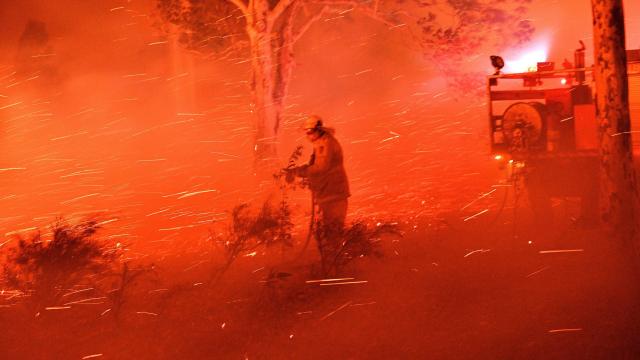Australia’s bushfires are a bright red warning sign that the climate crisis is most definitely upon us and worse lies ahead if we don’t curb carbon pollution. That also makes them a bright red warning sign for a disinformation campaign about their causes for anyone looking to maintain the status quo.
After months of hell, coverage of the bushfires has penetrated mainstream conversation around the globe with an uptick in Google search interest, news stories, and Twitter hashtags. Celebrities even used their time at the Golden Globes to outline the clear link between the fires and climate change.
It’s an easy one to make since Australia just had its hottest year on record and many areas are going through a record drought as well, and research has shown climate change is already increasing the risk of fire weather in the Land Down Under. Some real Climate Science 101 stuff.
Yet over the past week, a counter-narrative has emerged that no, it’s not climate change. It’s arsonists and nefarious green groups who have pushed to stop back burns and controlled fires that reduce fire risk. While 183 arrests have been made in connection with fires, only 24 people have actually been charged with arson.
As for the green group’s thing, that’s just trash as far as I can tell. As someone who had a tweet about the fires “doing numbers” this week, I can attest to hordes of accounts responding with some iteration of these two conspiracy theories or mashing them up to say it’s, in fact, environmentalists who did the arson (which is weird since I thought they made it so that nobody could light fires but OK whatever).
Still, these narratives of blaming randos and trashing green groups have become catnip for conspiracy theorists and right-wingers invested in keeping the oil flowing. And research published by Timothy Graham of the Queensland University of Technology shows a dedicated group of bots is pushing the false arson narrative.
According to ZDNet, Graham tracked the users of a few hashtags including #ArsonEmergency and found high activity coming from bot accounts. He told ZDNet he was “at least confident” it was a disinformation campaign, though the sample size was relatively small by numbering in the hundreds.
The fires have created a powerful environment to fan disinformation. People are emotional. I mean, how could they not be with Millions of acres burned, a billion animals dead, smoke travelling 7,000 miles across the Pacific. This is a crisis, and it’s crystallised the reality of climate change for many.
That includes powerful interests that want to maintain the status quo and can see the writing on the wall that we need to get the economy unplugged from fossil fuels. In the face of overwhelming evidence, the only way to keep change from happening is to muddy the waters. And that’s what the conspiracy theories about arson and evil green groups are meant to do: Derail conversation, plant seeds of doubt, and slow action to meaningfully reduce emissions.
“Given the nature of misinformation, it can spread wildly, much like bushfire can,” Andrea Carson, a political communication researcher at La Trobe University, told the Australian Broadcasting Corporation.
This is hardly the only instance of fires bringing out crazy conspiracy theories. After California’s deadly Camp Fire, a bizarre conspiracy emerged about the government using a “direct energy weapon” to ignite it. And Brazil’s own president blamed environmental NGOs for fires there over the summer (sound familiar?) before walking it back.
But that doesn’t make the Australia disinformation any less tragic. In some ways, it’s more so as it comes at the start of a decade when the world needs to get its arse in gear to solve the climate crisis. The lies being spread about the fires show that we won’t get the world to take the needed actions without a serious fight with bad-faith actors. But hey, at least we know what we’re up against.
